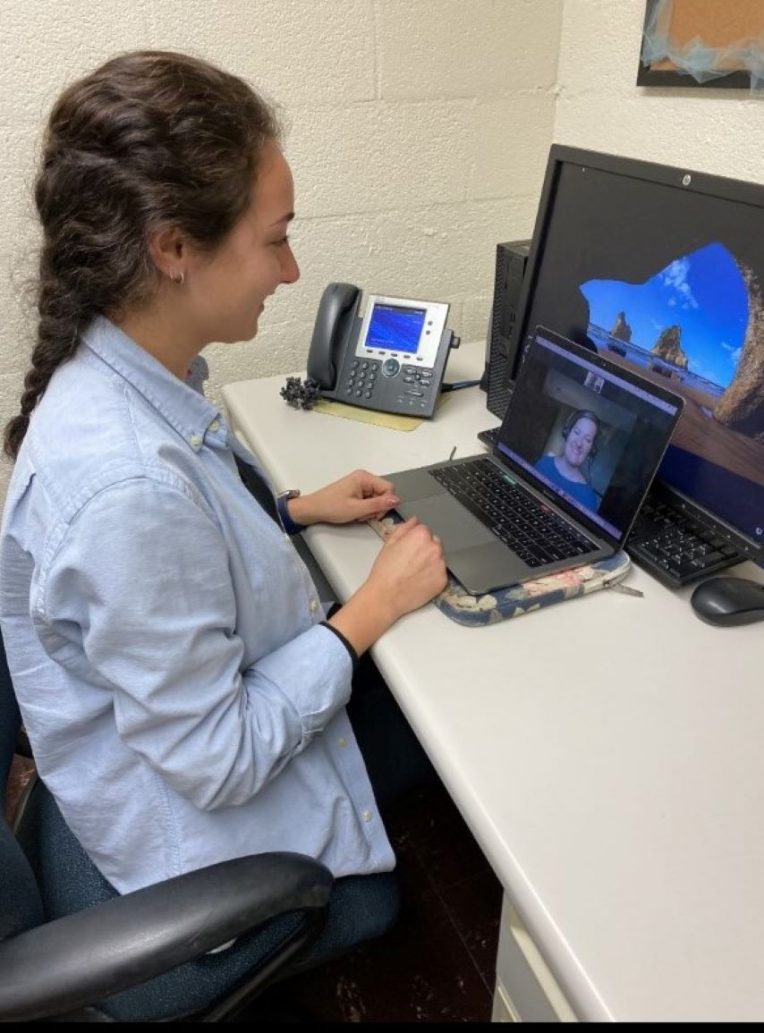Researchers continue to investigate interventions to enhance and maximize cognitive function for successful aging. Two clinical research programs, Communication Designs and #GoldenTweets, are being studied to examine cognitive training and stimulation interventions for individuals with normal cognitive aging and populations with communication disorders. These two programs have been offered in the last few years and are now giving participants the option to complete the program in-person or online. Offering the programs via telepractice will not only allow participants to be able to stay in the safety of their homes due to the COVID-19 pandemic, but also allow those who live out of range from the University to take part in the studies.
Communication Designs is a multi-component cognitive stimulation program. Researchers are examining the effects of cognitive training, stimulation exercises, and education on cognitive function. This program is available for individuals 60-90 years old with normal cognitive aging, and individuals 18 and older with aphasia, traumatic brain injury, mild cognitive impairment, and dementia. There are four components to the study: cognitive training, cognitive stimulation, educational sessions, and individualized home assignments. The cognitive training is an individualized session, targeting each participant’s area(s) of challenge. Cognitive stimulation sessions include group activities designed to focus on areas that are more likely to decline with age, including cognitive speed, executive functions, and memory. While those areas most susceptible to age are targeted, participants complete exercises for all five domains of cognition, including: memory, language, executive function, attention span, and visuospatial skills. The at-home component of this program includes activities that can completed using a Nintendo DS system or paper-and-pencil activities, if preferred. The educational component of this program will help participants understand different lifestyle factors that can influence cognitive function as we age and ways to mitigate these naturally occurring changes.
GoldenTweets is a social media training program designed to investigate how new media affects cognitive function, social engagement, and self-presentation. The #GoldenTweets study is available for individuals 55 years old and older with normal cognitive aging and individuals 18 years and older with aphasia, mild cognitive impairment, traumatic brain injury, stuttering, and voice disorders. There are four components to the study: pre-assessment, social media training, social media engagement, and post-assessment. The pre-assessment consists of a cognitive screen. This will establish baseline data. The social media training phase includes introduction and training for communication using the social media platform, Twitter. The participants will create a Twitter account and learn about social media literacy, being social, trending and sharing. During the social media engagement phase, the participants will be encouraged to independently use their accounts by posting, retweeting, responding, sharing, reflecting, using Twitter lingo and connecting with friends and family. The study will end with a post-assessment, identical to the pre-assessment. This social media training program will not only provide education and training to individuals about Twitter, it will also provide opportunities to build greater communication networks, and research insights for the potential use of technology to increase cognitive function, communication and interventions with aging adults.
The Communication Designs and Golden Tweets programs are overseen by Dr. Jennine Harvey-Northrop, associate professor in the Department of Communication Sciences and Disorders (CSD). The two clinical research programs provide an opportunity for speech-language pathology graduate students to administer each aspect of the program, where they will implement the protocols and build rapport with participants. These programs may provide insight for how we understand and implement interventions to increase cognitive wellness as we age, prevent communication and cognitive decline, and implement treatments across different populations. The programs will continue to be offered in spring 2021.
If you would like to participate or receive more information about these programs or any research in the lab, please call (309) 438-8934.
About the lab
At the Neurologic Communication Disorders and Cognitive Wellness Lab, we are conducting research to advance our knowledge and service for the residents of Bloomington-Normal, Illinois who have neurologic and cognitive communication disorders. We are also working with active seniors who are interested in participating in mental fitness programs designed to maintain and/or improve brain health and agility. Our mission is to educate and increase community awareness about cognitive stimulation and its effects on brain aging. We also are specialists who help patients that have sustained brain damage from strokes, head injuries, and other neurologic diseases.

